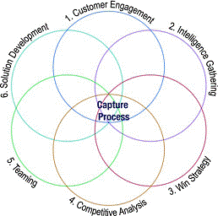Every fishing story sounds similar. It starts out with a description of the setting, a little nibble, then the sudden strike setting the hook, and the fight. Often, the story concludes with a drawn-out struggle where the line almost breaks and the buddy brings the net over to pull the fish in. In every subsequent retelling of the story, the fish seems to get a little bigger, and the fight becomes a bit more histrionic.
Fishing can be hit or miss, and sometimes the fish just aren’t biting. Yet there are those who still seem to catch fish all day, even though no one else is. Capture is somewhat like fishing in that sense. There is a process and art to capture that you need to know in order to have more predictable results. The process is addressing the six areas of capture: customer engagement, intelligence gathering, win strategy development, competitive analysis, teaming, and solution development, and the art is developing the sixth sense of knowing the right thing to do.
The six capture areas make it easier to remember the key steps and measure your progress. In this model, capture includes six fundamental areas that are completely interconnected, interlocking, and overlapping. If you miss one area, your preparation effort becomes incomplete in every other area, lowering your probability of winning by a factor of six. For example, if you omit Capture Area 3, Win Strategy, then your entire capture effort will be unfocused. If you omit Capture Area 4, Competitive Analysis, then you might team with the wrong companies that won’t give you an advantage, competitive prices, or you may miss an opportunity to proactively show the customer how you are better than your competition. Focusing on just six areas and not dozens of granular steps will help you easily remember which parts need to progress on a weekly basis, and how the other areas may be affected if you haven’t addressed a particular area.
Here is additional food for thought. What separates professional anglers from amateur fishermen? Is it knowledge? Practice? Or is it something more, like instinct? Building on their knowledge and experience, pros develop that instinct, or sixth sense, as to where and when the fish are biting, what bait they prefer, and which are near the surface or hanging out on the bottom.
When you apply your capture knowledge and immerse yourself in capturing that “must win” opportunity, you will inevitably start sensing the things around it. For example, to avoid falling into the “big fish story,” I’ll offer an anecdote from our CEO. In the middle of a capture effort, Olessia got a hunch that the team needed to develop a detailed approach with past performance citations to the entire highly detailed statement of work (SOW). The team questioned her decision heavily but followed the directions while harboring resentments. She was insistent that this was a necessary investment of time, effort, and resources. When the RFP came out, it asked for a mature, detailed approach with past performance citations to every single item of a long SOW, while there was a very short period to write the proposal. Luckily, most of the work was already done, and the team let out a sigh of relief (and an apology for giving her a hard time earlier). During capture, there was no way of logically predicting that the RFP was going to ask for this level of detail, but it did. Her intuition saved the day.
Good capture managers are able to predict what is going to happen down to the delays, cancellations, and specific requirements for which they can prepare ahead of time. The instincts are real, and people who know their customers and every detail about the opportunity know where to be when to be there, and what to be therewith. The intuition develops from training, professional growth, and practicing capture techniques over time. This intuition gives them a competitive advantage over everyone else on the bid. When a capture is done correctly, following all the six steps above, your company can be positioned to win the contract long before it is released, so you create your own competitive advantage.
Do you have your own stories of knowing ahead of time what was going to happen with an opportunity? Or perhaps good fishing stories?
Best regards,
David Huff
Business Development and Operations Manager
OST Global Solutions, Inc.
…Because There is No Second Place in Proposals! TM
https://www.ostglobalsolutions.com
Contact us to learn more.

